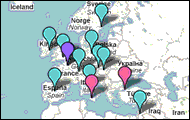
Is America falling behind other countries in renewable energy, health care or quality of life? What are we doing right when it comes to taxes, innovation and crime prevention? Are perceived differences between nations statistically significant? A growing international movement hopes to answer these questions with help from researchers around the world.
The Global Project on Measuring the Progress of Societies, launched in 2008, aims to create a set of international standards for measuring social, economic and environmental indicators of well-being.This effort features contributions from a broad range of agencies, corporations, educators, nonprofit organizations and statistical offices that span five continents.
Use the interactive map below to explore efforts to measure progress in each of these 20 countries: Australia, Austria, Bhutan, Canada, France, Germany, Hungary, Ireland, Italy, Japan, Jordan, Mexico, the Philippines, South Africa, South Korea, Spain, Sweden, Switzerland, the United Kingdom and the United States.
Each bubble, or colored icon contains a list of associate and correspondent organizations.
View The Global Project: Measuring Progress Worldwide in a larger map
How the Global Project Works
Participation in the project is broken down into five categories according to the organization's informational website:
Partners: Major international organizations that play a key role in the Global Project by investing substantial resources over the long term.
Associates: Public and private organizations from around the world that contribute to Global Project activities and work to implement goals outlined in the 2007 Istanbul Declaration.
Sponsors: Groups that provide financial donations or in-kind support for the project as a whole or for specific tasks.
Technical Advisers: Companies or organizations that have an advisory role on the Global Project board.
Correspondents: Organizations that serve as nodes, or focal points in the Global Project's international network. Correspondents share knowledge and experience with other indicator systems in their country or region.
SUSA's Role: Correspondent Organization
The State of the USA was not the first credible effort to measure progress, but it aims to set new standards for data quality, openness and transparency. (See History and Policies) As a participant in the project, SUSA is committed to making international data both accessible and easy to use.
What international efforts do you support?
Which one holds the most promise?
What would you like to see more of?
Learn about the Global Project's latest initiatives at Wikiprogress.org
Explore international data with Wikiprogress.stat and the OECD Explorer.
Related: SUSA Goes Global for International Comparisons
Interactive map by Anthony Calabrese, a State of the USA Web producer.
 Print This
Print This RSS Feed
RSS Feed